SLIDE PRESENTATION
Published on March 29, 2005
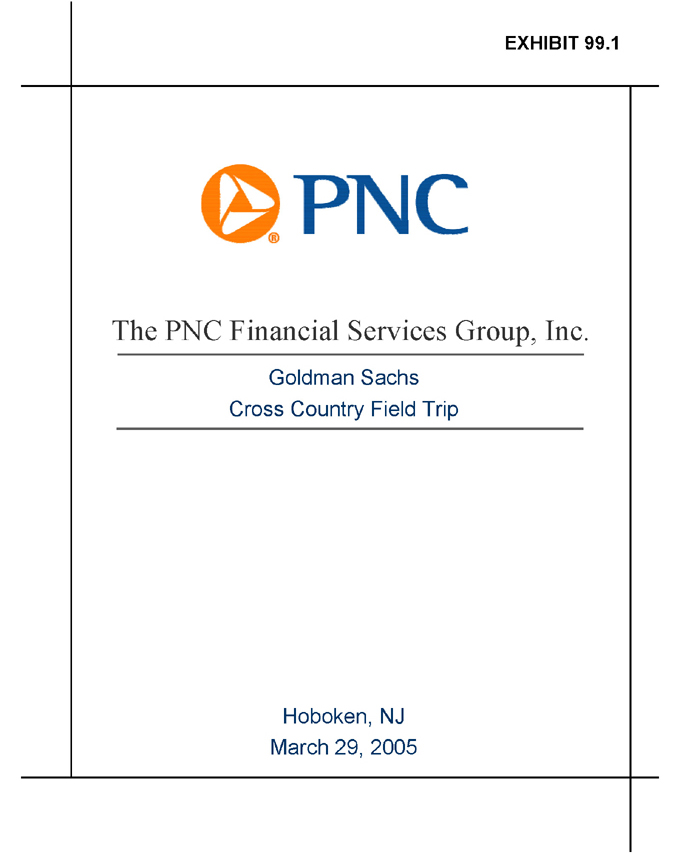
EXHIBIT 99.1
The PNC Financial Services Group, Inc.
Goldman Sachs Cross Country Field Trip
Hoboken, NJ March 29, 2005
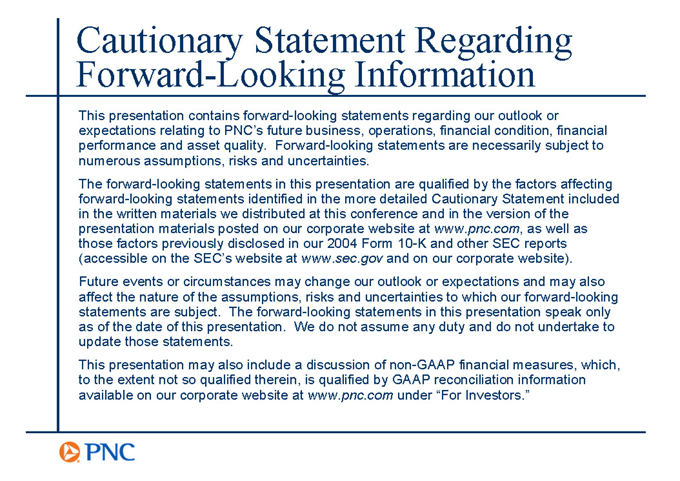
Cautionary Statement Regarding Forward-Looking Information
This presentation contains forward-looking statements regarding our outlook or expectations relating to PNCs future business, operations, financial condition, financial performance and asset quality. Forward-looking statements are necessarily subject to numerous assumptions, risks and uncertainties.
The forward-looking statements in this presentation are qualified by the factors affecting forward-looking statements identified in the more detailed Cautionary Statement included in the written materials we distributed at this conference and in the version of the presentation materials posted on our corporate website at www.pnc.com, as well as those factors previously disclosed in our 2004 Form 10-K and other SEC reports (accessible on the SECs website at www.sec.gov and on our corporate website). Future events or circumstances may change our outlook or expectations and may also affect the nature of the assumptions, risks and uncertainties to which our forward-looking statements are subject. The forward-looking statements in this presentation speak only as of the date of this presentation. We do not assume any duty and do not undertake to update those statements.
This presentation may also include a discussion of non-GAAP financial measures, which, to the extent not so qualified therein, is qualified by GAAP reconciliation information available on our corporate website at www.pnc.com under For Investors.

Todays Discussion
Regional Community Banking
Strategies for accelerating growth Neil Hall
Q&A with leadership team Joe Rockey
John Rogers
Jeff Schmidt
Ellen van der Horst
Branch visit
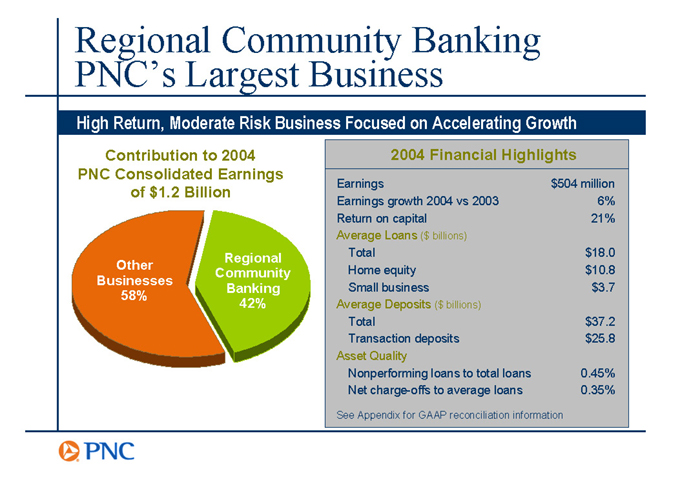
Regional Community Banking PNCs Largest Business
High Return, Moderate Risk Business Focused on Accelerating Growth
Contribution to 2004 PNC Consolidated Earnings of $1.2 Billion
Other Businesses 58%
Regional Community Banking 42%
2004 Financial Highlights
Earnings $504 million
Earnings growth 2004 vs 2003 6%
Return on capital 21%
Average Loans ($ billions)
Total $ 18.0
Home equity $ 10.8
Small business $ 3.7
Average Deposits ($ billions)
Total $ 37.2
Transaction deposits $ 25.8
Asset Quality
Nonperforming loans to total loans 0.45%
Net charge-offs to average loans 0.35%
See Appendix for GAAP reconciliation information
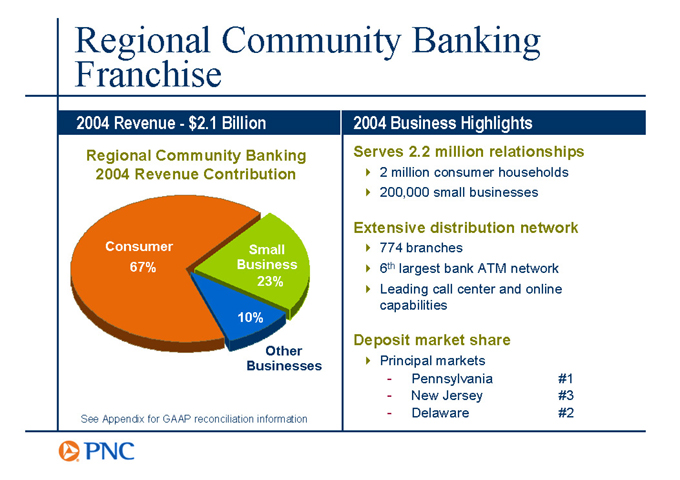
Regional Community Banking Franchise
2004 Revenue$2.1 Billion
Regional Community Banking 2004 Revenue Contribution
Consumer 67%
Small Business 23%
10%
Other Businesses
See Appendix for GAAP reconciliation information
2004 Business Highlights
Serves 2.2 million relationships
2 million consumer households 200,000 small businesses
Extensive distribution network
774 branches
6th largest bank ATM network Leading call center and online capabilities
Deposit market share
Principal markets
Pennsylvania #1
New Jersey #3
Delaware #2
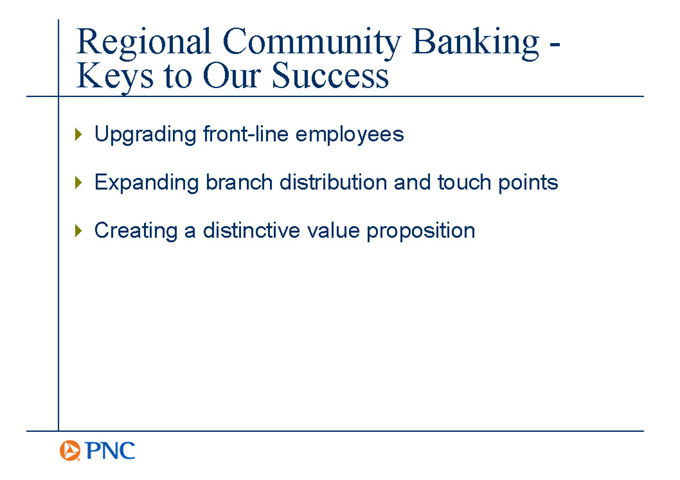
Regional Community Banking -Keys to Our Success
Upgrading front-line employees
Expanding branch distribution and touch points
Creating a distinctive value proposition
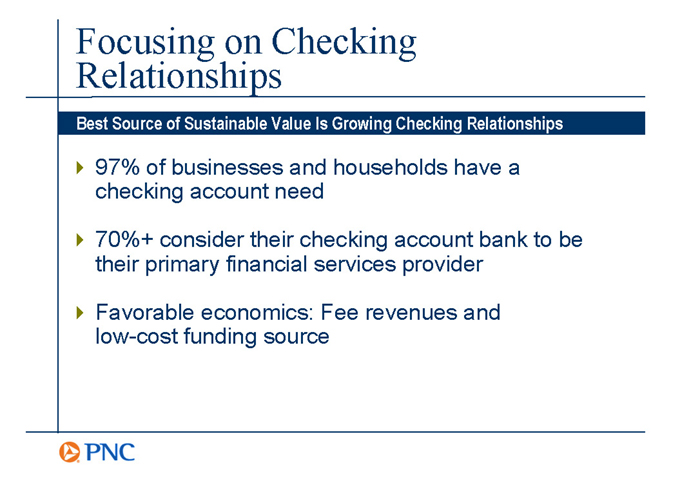
Focusing on Checking Relationships
Best Source of Sustainable Value Is Growing Checking Relationships
97% of businesses and households have a checking account need
70%+ consider their checking account bank to be their primary financial services provider
Favorable economics: Fee revenues and low-cost funding source
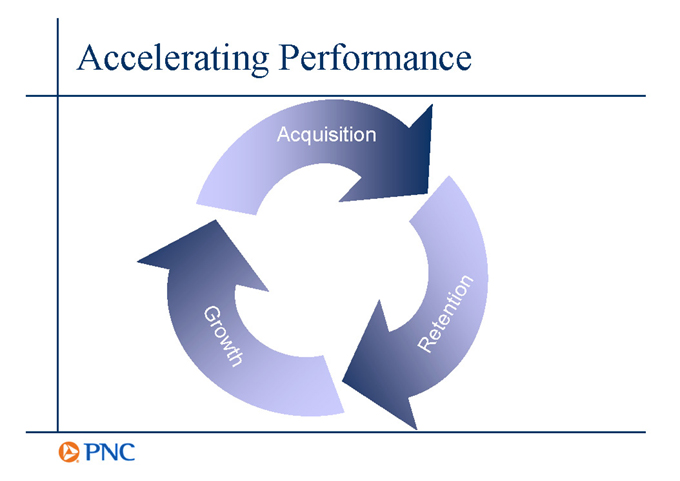
Accelerating Performance
Acquisition
Growth Retention
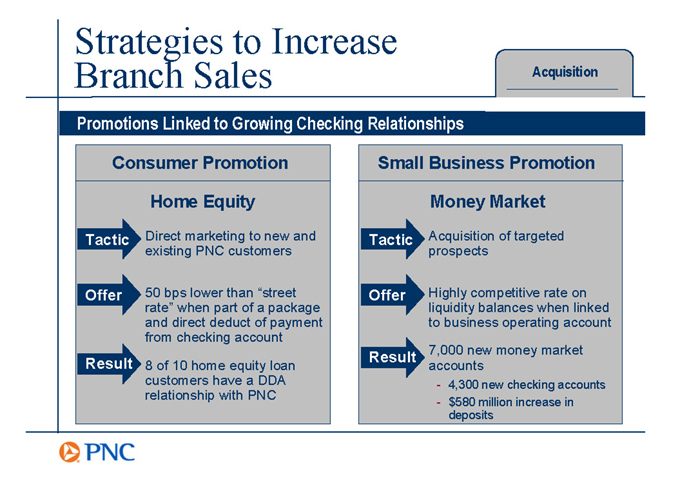
Strategies to Increase Branch Sales
Acquisition
Promotions Linked to Growing Checking Relationships
Consumer Promotion
Home Equity
Tactic Direct marketing to new and
existing PNC customers
Offer 50 bps lower than street
rate when part of a package
and direct deduct of payment
from checking account
Result 8 of 10 home equity loan
customers have a DDA
relationship with PNC
Small Business Promotion
Money Market
Tactic Acquisition of targeted
prospects
Offer Highly competitive rate on
liquidity balances when linked
to business operating account
Result 7,000 new money market
accounts
- 4,300 new checking accounts
- $580 million increase in
deposits
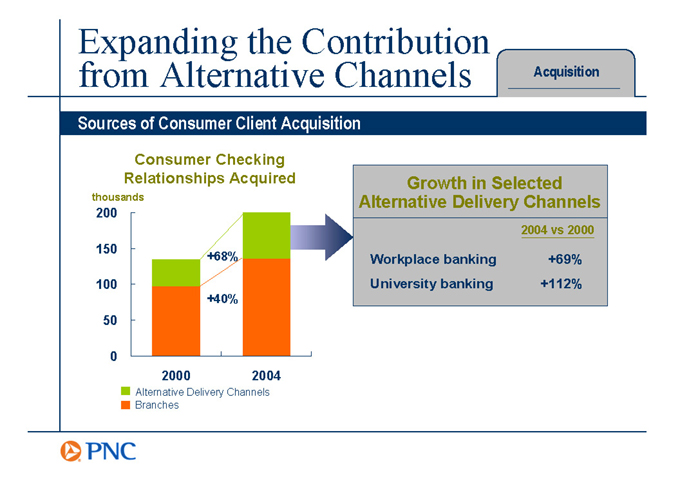
Expanding the Contribution from Alternative Channels
Acquisition
Sources of Consumer Client Acquisition
Consumer Checking Relationships Acquired thousands
200 150 100 50 0
+68%
+40%
2000 2004
Alternative Delivery Channels Branches
Growth in Selected Alternative Delivery Channels
2004 vs 2000
Workplace banking +69%
University banking +112%
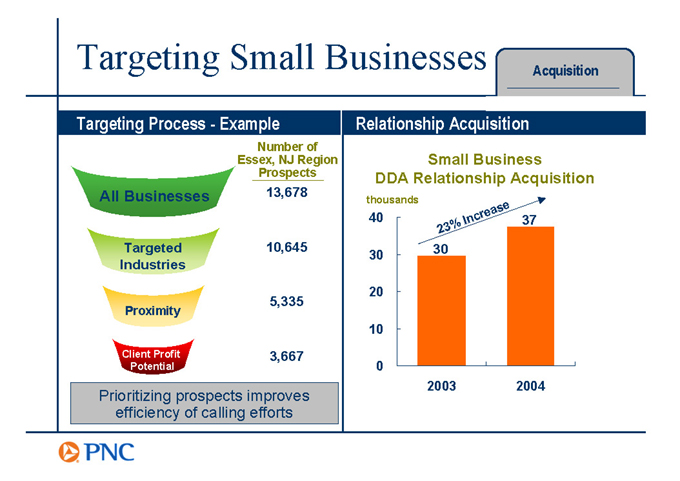
Targeting Small Businesses
Acquisition
Targeting ProcessExample
Number of
Essex, NJ Region
Prospects
All Businesses 13,678
Targeted 10,645
Industries
5,335
Proximity
Client Profit 3,667
Potential
Prioritizing prospects improves efficiency of calling efforts
Relationship Acquisition
Small Business DDA Relationship Acquisition thousands
40 30 20 10 0 Increase 23% 37
30
2003 2004
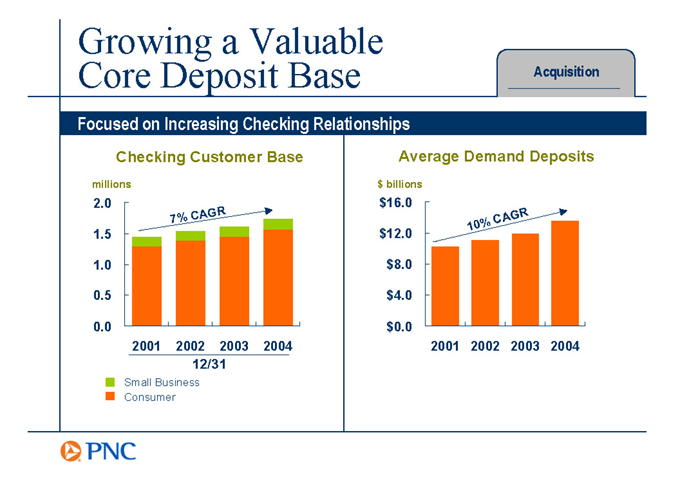
Growing a Valuable Core Deposit Base
Acquisition
Focused on Increasing Checking Relationships
Checking Customer Base
millions
2.0
1.5
1.0
0.5
0.0
CAGR 7%
2001 2002 2003 2004
12/31
Small Business Consumer
Average Demand Deposits $ billions
$16.0 $12.0 $8.0 $4.0 $0.0
10% CAGR
2001 2002 2003 2004
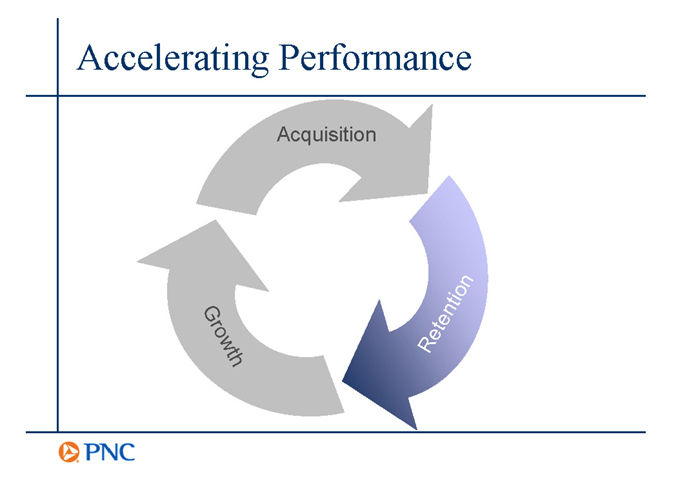
Accelerating Performance
Acquisition
Growth Retention
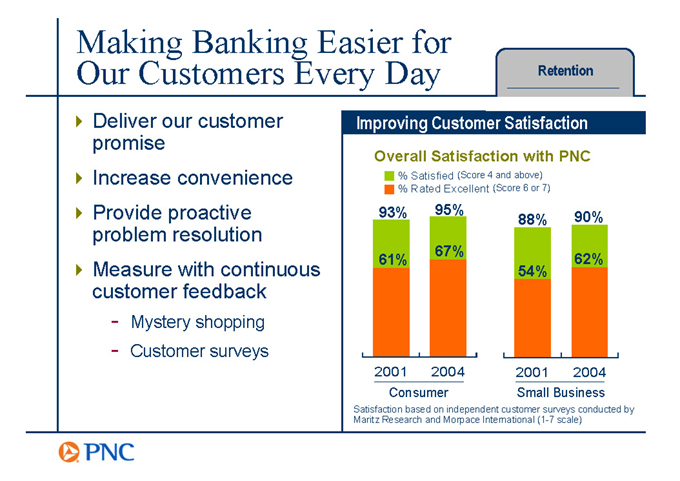
Making Banking Easier for Our Customers Every Day
Deliver our customer promise Increase convenience Provide proactive problem resolution Measure with continuous customer feedback
Mystery shopping Customer surveys
Retention
Improving Customer Satisfaction
Overall Satisfaction with PNC
% Satisfied (Score 4 and above)
% Rated Excellent (Score 6 or 7)
93% 95%
88% 90%
67%
61% 62%
54%
2001 2004 2001 2004
Consumer Small Business
Satisfaction based on independent customer surveys conducted by Maritz Research and Morpace International (1-7 scale)
14
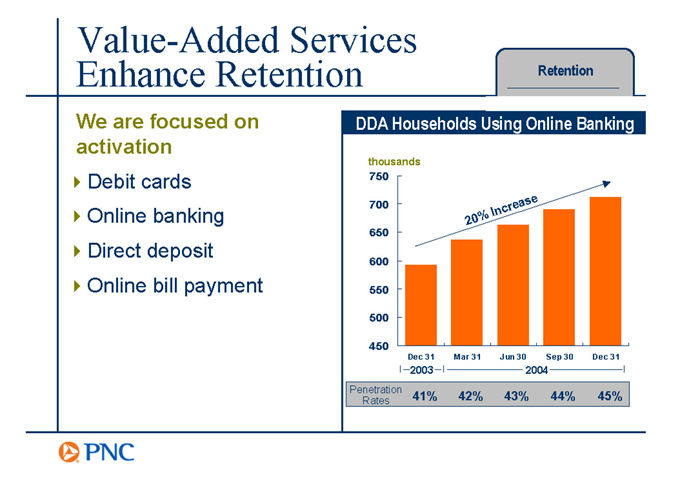
Value-Added Services Enhance Retention
Retention
We are focused on activation
Debit cards Online banking Direct deposit Online bill payment
DDA Households Using Online Banking thousands
750 700 650 600 550 500 450 Increase 20%
Dec 31 Mar 31 Jun 30 Sep 30 Dec 31
2003 2004
Penetration
Rates 41% 42% 43% 44% 45%
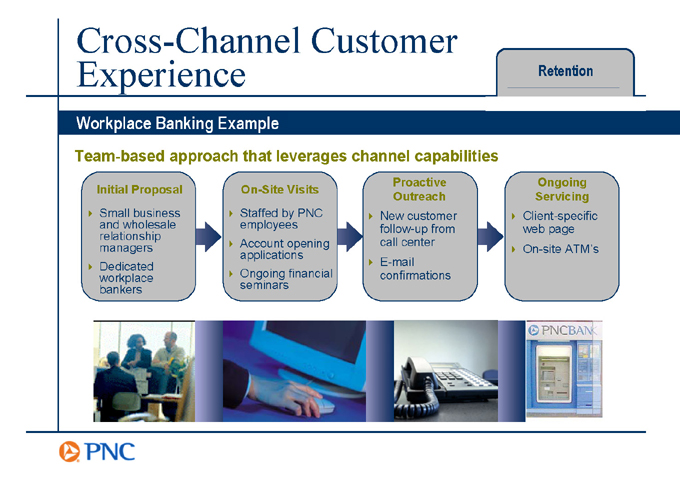
Cross-Channel Customer Experience
Retention
Workplace Banking Example
Team-based approach that leverages channel capabilities
Initial Proposal
Small business and wholesale relationship managers Dedicated workplace bankers
On-Site Visits
Staffed by PNC employees Account opening applications Ongoing financial seminars
Proactive Outreach
New customer follow-up from call center E-mail confirmations
Ongoing Servicing
Client-specific web page On-site ATMs
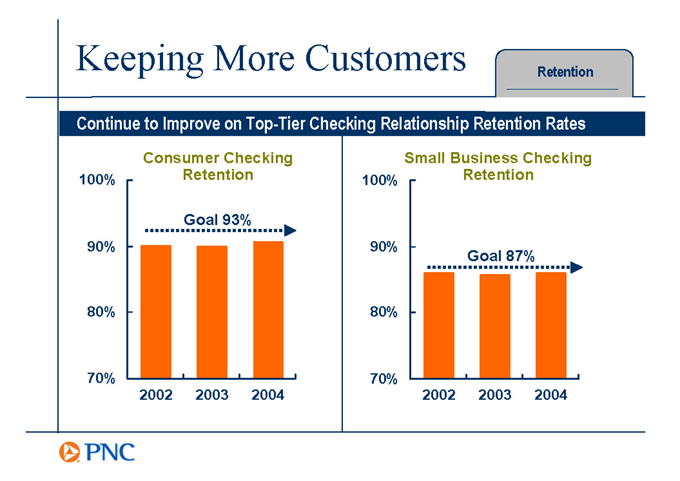
Keeping More Customers
Retention
Continue to Improve on Top-Tier Checking Relationship Retention Rates
Consumer Checking Retention
100% 90% 80% 70%
Goal 93%
2002 2003 2004
Small Business Checking Retention
100% 90% 80% 70%
Goal 87%
2002 2003 2004
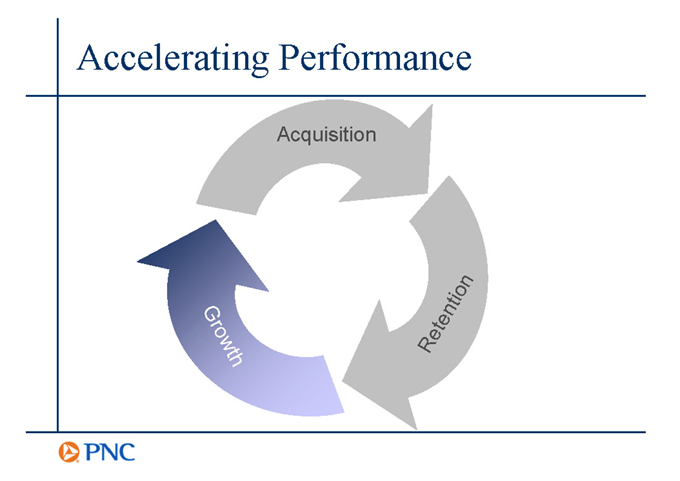
Accelerating Performance
Acquisition
Growth
Retention
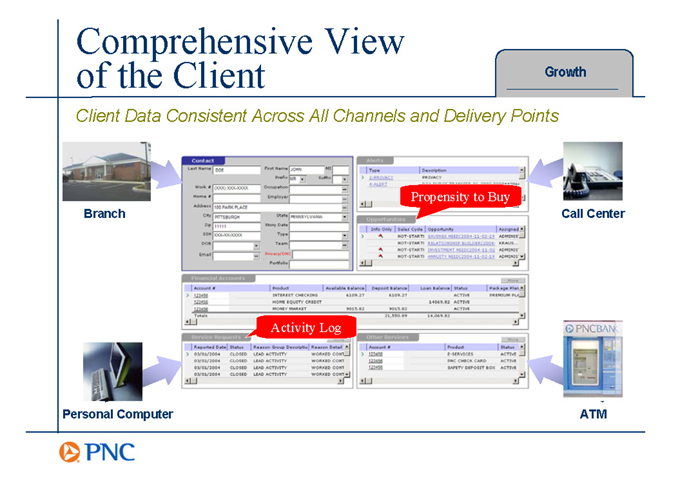
Comprehensive View of the Client
Growth
Client Data Consistent Across All Channels and Delivery Points
Branch
Personal Computer
Call Center
ATM
Propensity to Buy
Activity Log

Building a Relationship-Driven Sales Force
Growth
Additions in 2004 to accelerate growth
490 branch managers 51 licensed investment professionals 54 business bankers
Increasing Sales Force Investment
Sales-Oriented FTEs
6,000 5,000 4,000 3,000 2,000 1,000 0
Increase 10%
2003 2004
Sales-oriented FTEs excludes tellers
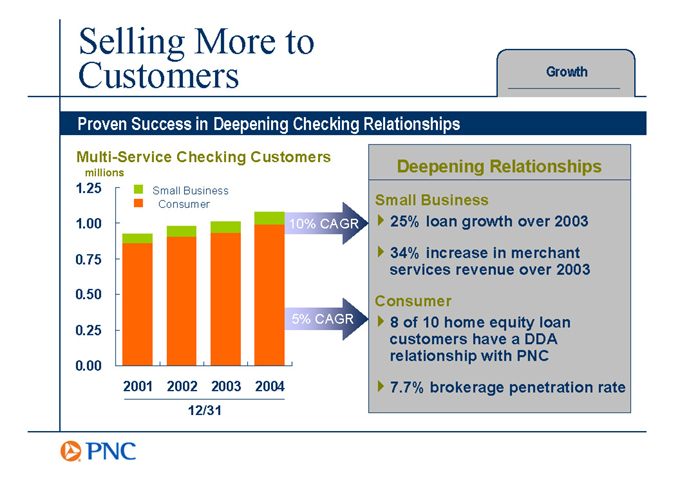
Selling More to Customers
Growth
Proven Success in Deepening Checking Relationships
Multi-Service Checking Customers
millions
1.25
1.00
0.75
0.50
0.25
0.00
Small Business Consumer
10% CAGR
5% CAGR
2001 2002 2003 2004
12/31
Deepening Relationships
Small Business
25% loan growth over 2003
34% increase in merchant services revenue over 2003
Consumer
8 of 10 home equity loan customers have a DDA relationship with PNC
7.7% brokerage penetration rate
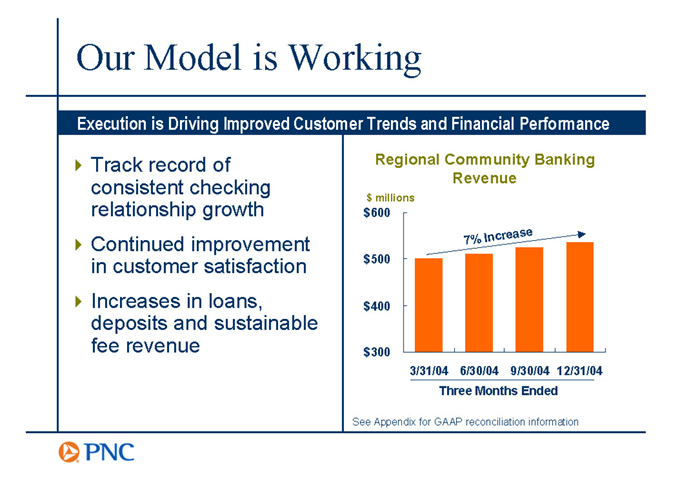
Our Model is Working
Execution is Driving Improved Customer Trends and Financial Performance
Track record of consistent checking relationship growth Continued improvement in customer satisfaction Increases in loans, deposits and sustainable fee revenue
Regional Community Banking Revenue $ millions $600
$500 $400 $300
3/31/04 6/30/04 9/30/04 12/31/04
Three Months Ended 7% Increase
See Appendix for GAAP reconciliation information
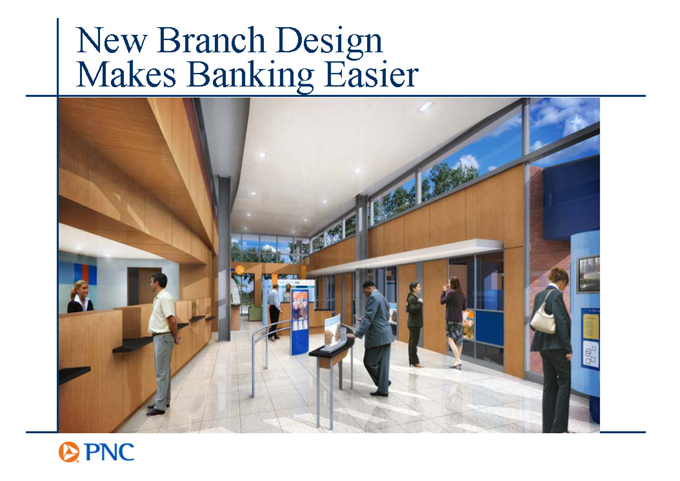
New Branch Design Makes Banking Easier
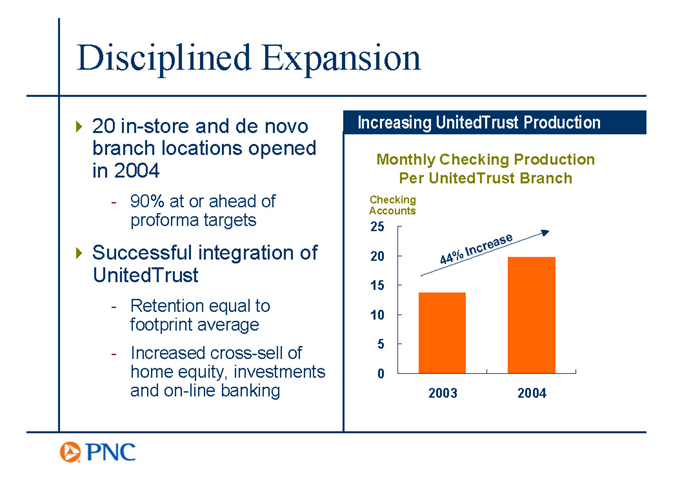
Disciplined Expansion
20 in-store and de novo branch locations opened in 2004
90% at or ahead of proforma targets
Successful integration of UnitedTrust
Retention equal to footprint average Increased cross-sell of home equity, investments and on-line banking
Increasing UnitedTrust Production
Monthly Checking Production Per UnitedTrust Branch
Checking Accounts
25 20 15 10 5 0 Increase 44%
2003 2004
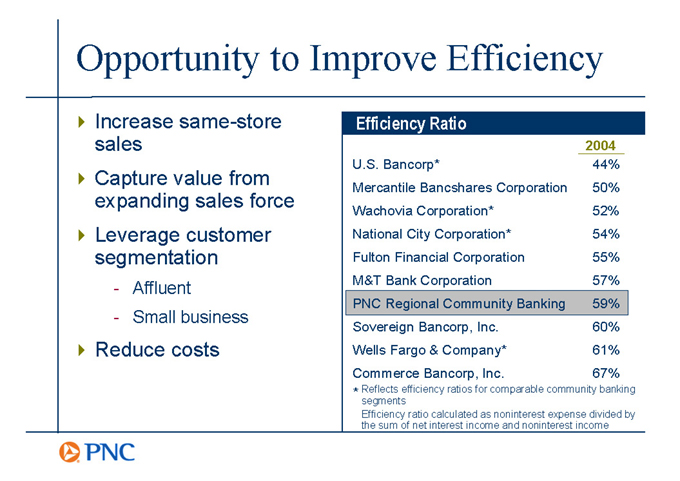
Opportunity to Improve Efficiency
Increase same-store sales Capture value from expanding sales force Leverage customer segmentation
Affluent Small business
Reduce costs
Efficiency Ratio
2004
U.S. Bancorp* 44%
Mercantile Bancshares Corporation 50%
Wachovia Corporation* 52%
National City Corporation* 54%
Fulton Financial Corporation 55%
M&T Bank Corporation 57%
PNC Regional Community Banking 59%
Sovereign Bancorp, Inc. 60%
Wells Fargo & Company* 61%
Commerce Bancorp, Inc. 67%
* Reflects efficiency ratios for comparable community banking
segments
Efficiency ratio calculated as noninterest expense divided by
the sum of net interest income and noninterest income
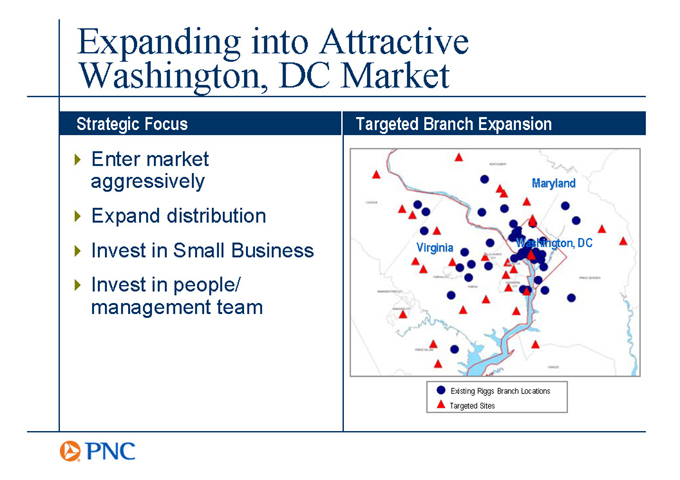
Expanding into Attractive Washington, DC Market
Strategic Focus
Enter market aggressively Expand distribution Invest in Small Business Invest in people/ management team
Targeted Branch Expansion
Maryland
Virginia
Washington, DC
Existing Riggs Branch Locations Targeted Sites
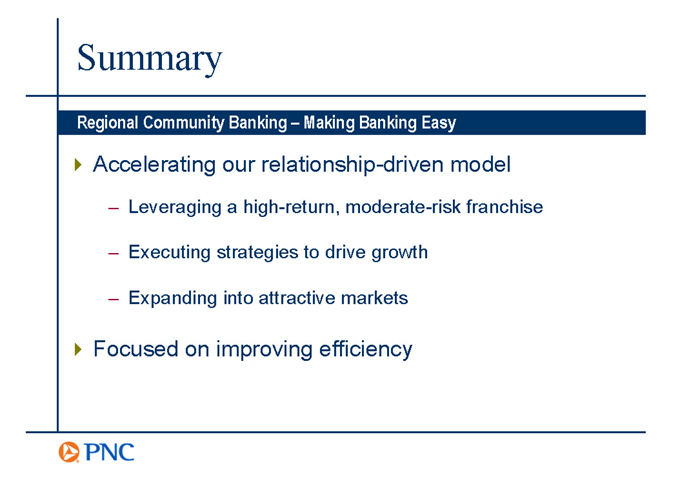
Summary
Regional Community Banking Making Banking Easy
Accelerating our relationship-driven model
Leveraging a high-return, moderate-risk franchise Executing strategies to drive growth Expanding into attractive markets
Focused on improving efficiency
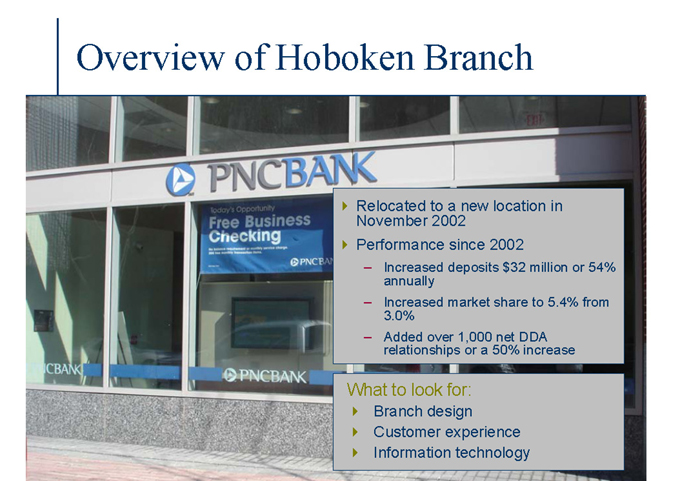
Overview of Hoboken Branch
Relocated to a new location in November 2002 Performance since 2002
Increased deposits $32 million or 54% annually Increased market share to 5.4% from 3.0% Added over 1,000 net DDA relationships or a 50% increase
What to look for:
Branch design Customer experience Information technology
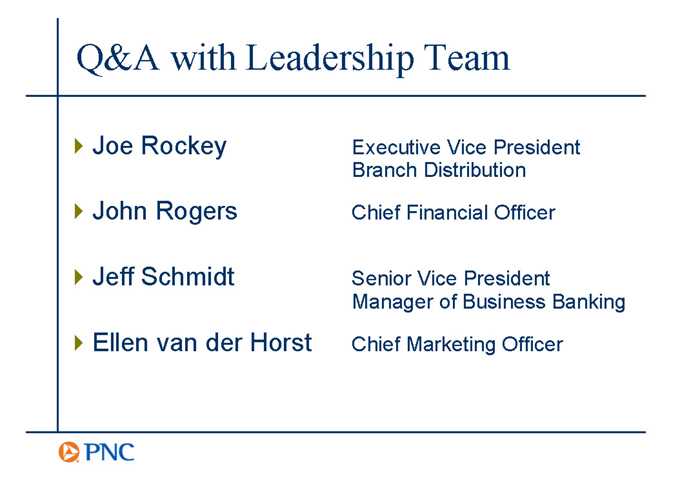
Q&A with Leadership Team
Joe Rockey Executive Vice President
Branch Distribution
John Rogers Chief Financial Officer
Jeff Schmidt Senior Vice President
Manager of Business Banking
Ellen van der Horst Chief Marketing Officer
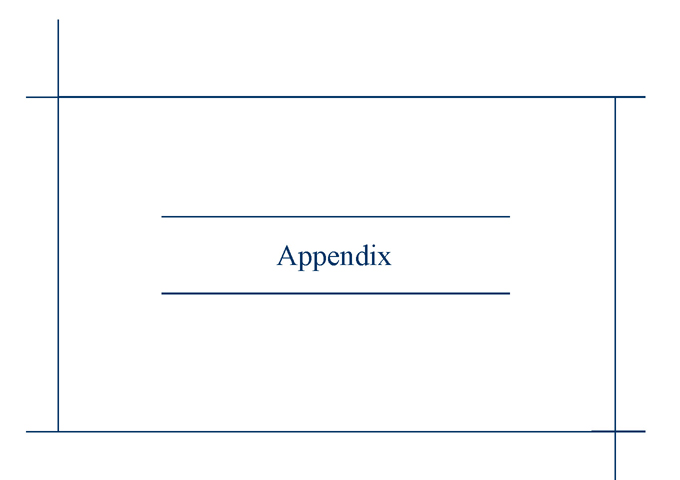
Appendix
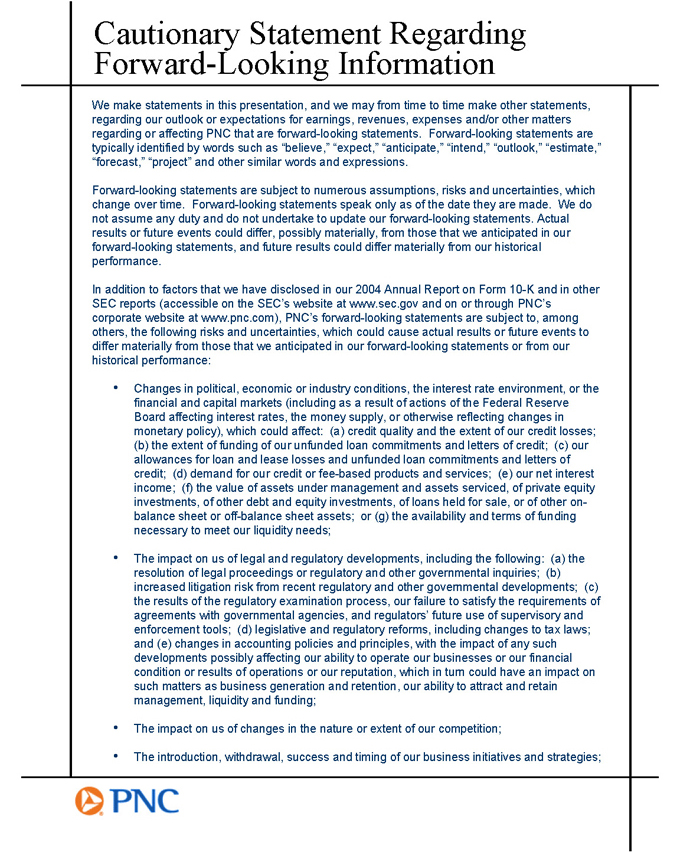
Cautionary Statement Regarding Forward-Looking Information
We make statements in this presentation, and we may from time to time make other statements, regarding our outlook or expectations for earnings, revenues, expenses and/or other matters regarding or affecting PNC that are forward-looking statements. Forward-looking statements typically identified by words such as believe, expect, anticipate, intend, outlook, forecast, project and other similar words and expressions.
Forward-looking statements are subject to numerous assumptions, risks and uncertainties, change over time. Forward-looking statements speak only as of the date they are made. We not assume any duty and do not undertake to update our forward-looking statements. Actual results or future events could differ, possibly materially, from those that we anticipated in our forward-looking statements, and future results could differ materially from our historical performance.
In addition to factors that we have disclosed in our 2004 Annual Report on Form 10-K and in SEC reports (accessible on the SECs website at www.sec.gov and on or through PNCs corporate website at www.pnc.com), PNCs forward-looking statements are subject to, among others, the following risks and uncertainties, which could cause actual results or future events differ materially from those that we anticipated in our forward-looking statements or from our historical performance:
Changes in political, economic or industry conditions, the interest rate environment, or the financial and capital markets (including as a result of actions of the Federal Reserve Board affecting interest rates, the money supply, or otherwise reflecting changes in monetary policy), which could affect: (a) credit quality and the extent of our credit losses; (b) the extent of funding of our unfunded loan commitments and letters of credit; (c) our allowances for loan and lease losses and unfunded loan commitments and letters of credit; (d) demand for our credit or fee-based products and services; (e) our net interest income; (f) the value of assets under management and assets serviced, of private equity investments, of other debt and equity investments, of loans held for sale, or of other on-balance sheet or off-balance sheet assets; or (g) the availability and terms of funding necessary to meet our liquidity needs;
The impact on us of legal and regulatory developments, including the following: (a) the resolution of legal proceedings or regulatory and other governmental inquiries; (b) increased litigation risk from recent regulatory and other governmental developments; (c) the results of the regulatory examination process, our failure to satisfy the requirements of agreements with governmental agencies, and regulators future use of supervisory and enforcement tools; (d) legislative and regulatory reforms, including changes to tax laws; and (e) changes in accounting policies and principles, with the impact of any such developments possibly affecting our ability to operate our businesses or our financial condition or results of operations or our reputation, which in turn could have an impact on such matters as business generation and retention, our ability to attract and retain management, liquidity and funding;
The impact on us of changes in the nature or extent of our competition;
The introduction, withdrawal, success and timing of our business initiatives and strategies;
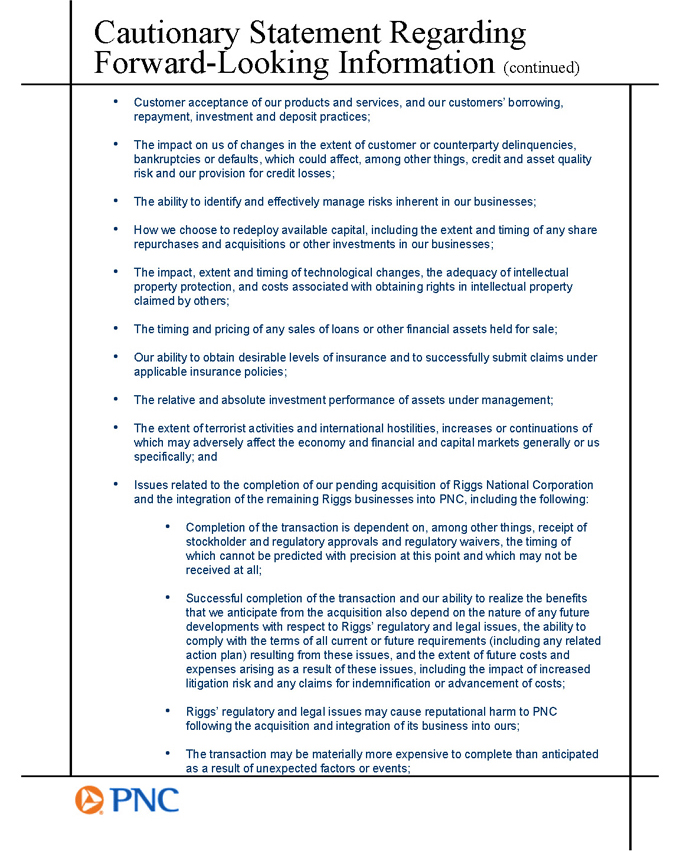
Cautionary Statement Regarding Forward-Looking Information (continued)
Customer acceptance of our products and services, and our customers borrowing, repayment, investment and deposit practices;
The impact on us of changes in the extent of customer or counterparty delinquencies, bankruptcies or defaults, which could affect, among other things, credit and asset quality risk and our provision for credit losses;
The ability to identify and effectively manage risks inherent in our businesses;
How we choose to redeploy available capital, including the extent and timing of any share repurchases and acquisitions or other investments in our businesses;
The impact, extent and timing of technological changes, the adequacy of intellectual property protection, and costs associated with obtaining rights in intellectual property claimed by others;
The timing and pricing of any sales of loans or other financial assets held for sale;
Our ability to obtain desirable levels of insurance and to successfully submit claims under applicable insurance policies;
The relative and absolute investment performance of assets under management;
The extent of terrorist activities and international hostilities, increases or continuations of which may adversely affect the economy and financial and capital markets generally or us specifically; and
Issues related to the completion of our pending acquisition of Riggs National Corporation and the integration of the remaining Riggs businesses into PNC, including the following:
Completion of the transaction is dependent on, among other things, receipt of stockholder and regulatory approvals and regulatory waivers, the timing of which cannot be predicted with precision at this point and which may not be received at all;
Successful completion of the transaction and our ability to realize the benefits that we anticipate from the acquisition also depend on the nature of any future developments with respect to Riggs regulatory and legal issues, the ability to comply with the terms of all current or future requirements (including any related action plan) resulting from these issues, and the extent of future costs and expenses arising as a result of these issues, including the impact of increased litigation risk and any claims for indemnification or advancement of costs;
Riggs regulatory and legal issues may cause reputational harm to PNC following the acquisition and integration of its business into ours;
The transaction may be materially more expensive to complete than anticipated as a result of unexpected factors or events;
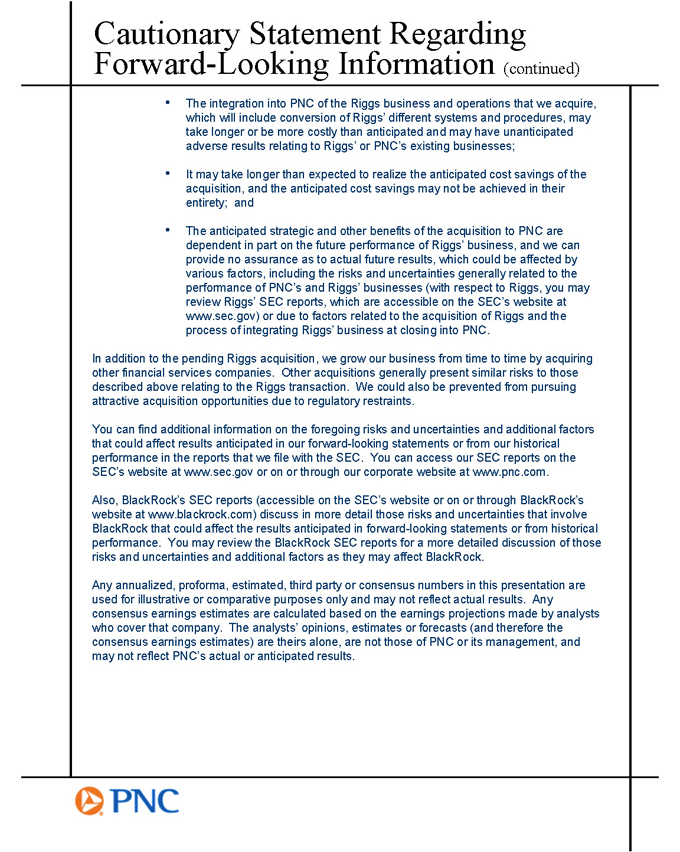
Cautionary Statement Regarding Forward-Looking Information (continued)
The integration into PNC of the Riggs business and operations that we acquire, which will include conversion of Riggs different systems and procedures, may take longer or be more costly than anticipated and may have unanticipated adverse results relating to Riggs or PNCs existing businesses;
It may take longer than expected to realize the anticipated cost savings of the acquisition, and the anticipated cost savings may not be achieved in their entirety; and
The anticipated strategic and other benefits of the acquisition to PNC are dependent in part on the future performance of Riggs business, and we can provide no assurance as to actual future results, which could be affected by various factors, including the risks and uncertainties generally related to the performance of PNCs and Riggs businesses (with respect to Riggs, you may review Riggs SEC reports, which are accessible on the SECs website at www.sec.gov) or due to factors related to the acquisition of Riggs and the process of integrating Riggs business at closing into PNC.
In addition to the pending Riggs acquisition, we grow our business from time to time by acquiring other financial services companies. Other acquisitions generally present similar risks to those described above relating to the Riggs transaction. We could also be prevented from pursuing attractive acquisition opportunities due to regulatory restraints.
You can find additional information on the foregoing risks and uncertainties and additional factors that could affect results anticipated in our forward-looking statements or from our historical performance in the reports that we file with the SEC. You can access our SEC reports on the SECs website at www.sec.gov or on or through our corporate website at www.pnc.com.
Also, BlackRocks SEC reports (accessible on the SECs website or on or through BlackRocks website at www.blackrock.com) discuss in more detail those risks and uncertainties that involve BlackRock that could affect the results anticipated in forward-looking statements or from historical performance. You may review the BlackRock SEC reports for a more detailed discussion of those risks and uncertainties and additional factors as they may affect BlackRock.
Any annualized, proforma, estimated, third party or consensus numbers in this presentation are used for illustrative or comparative purposes only and may not reflect actual results. Any consensus earnings estimates are calculated based on the earnings projections made by analysts who cover that company. The analysts opinions, estimates or forecasts (and therefore the consensus earnings estimates) are theirs alone, are not those of PNC or its management, and may not reflect PNCs actual or anticipated results.
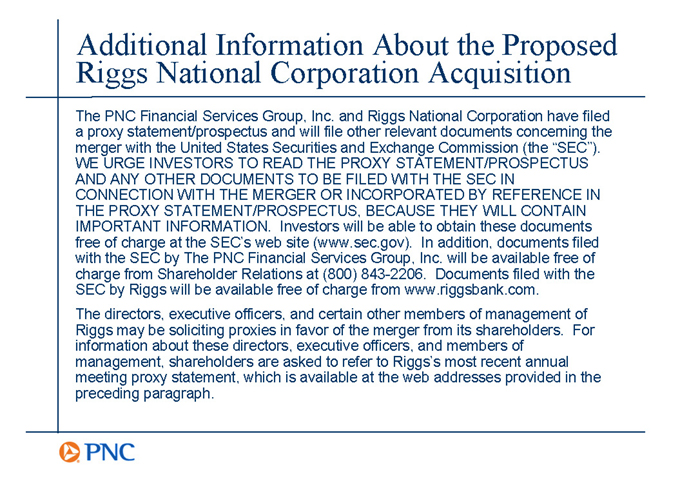
Additional Information About the Proposed Riggs National Corporation Acquisition
The PNC Financial Services Group, Inc. and Riggs National Corporation have filed a proxy statement/prospectus and will file other relevant documents concerning the merger with the United States Securities and Exchange Commission (the SEC). WE URGE INVESTORS TO READ THE PROXY STATEMENT/PROSPECTUS AND ANY OTHER DOCUMENTS TO BE FILED WITH THE SEC IN
CONNECTION WITH THE MERGER OR INCORPORATED BY REFERENCE IN THE PROXY STATEMENT/PROSPECTUS, BECAUSE THEY WILL CONTAIN IMPORTANT INFORMATION. Investors will be able to obtain these documents free of charge at the SECs web site (www.sec.gov). In addition, documents filed with the SEC by The PNC Financial Services Group, Inc. will be available free of charge from Shareholder Relations at (800) 843-2206. Documents filed with the SEC by Riggs will be available free of charge from www.riggsbank.com.
The directors, executive officers, and certain other members of management of Riggs may be soliciting proxies in favor of the merger from its shareholders. For information about these directors, executive officers, and members of management, shareholders are asked to refer to Riggss most recent annual meeting proxy statement, which is available at the web addresses provided in the preceding paragraph.
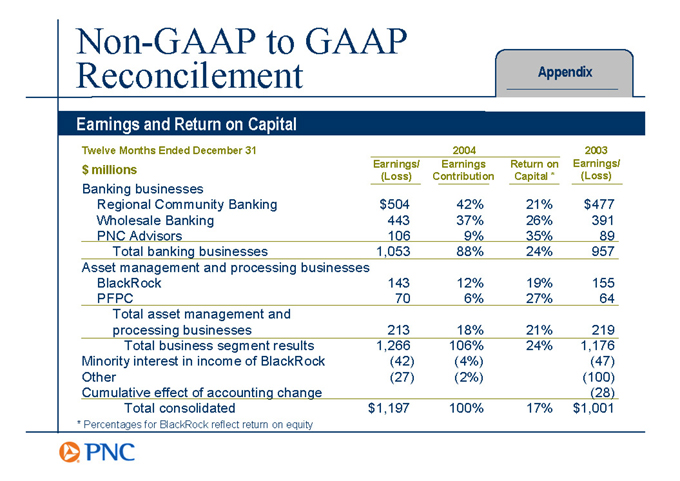
Non-GAAP to GAAP Reconcilement
Appendix
Earnings and Return on Capital
Twelve Months Ended December 31 2004 2003
Earnings/ Earnings Return on Earnings/
$ millions
(Loss) Contribution Capital * (Loss)
Banking businesses
Regional Community Banking $ 504 42% 21% $ 477
Wholesale Banking 443 37% 26% 391
PNC Advisors 106 9% 35% 89
Total banking businesses 1,053 88% 24% 957
Asset management and processing businesses
BlackRock 143 12% 19% 155
PFPC 70 6% 27% 64
Total asset management and
processing businesses 213 18% 21% 219
Total business segment results 1,266 106% 24% 1,176
Minority interest in income of BlackRock (42) (4%) (47)
Other (27) (2%) (100)
Cumulative effect of accounting change (28)
Total consolidated $ 1,197 100% 17% $ 1,001
* Percentages for BlackRock reflect return on equity
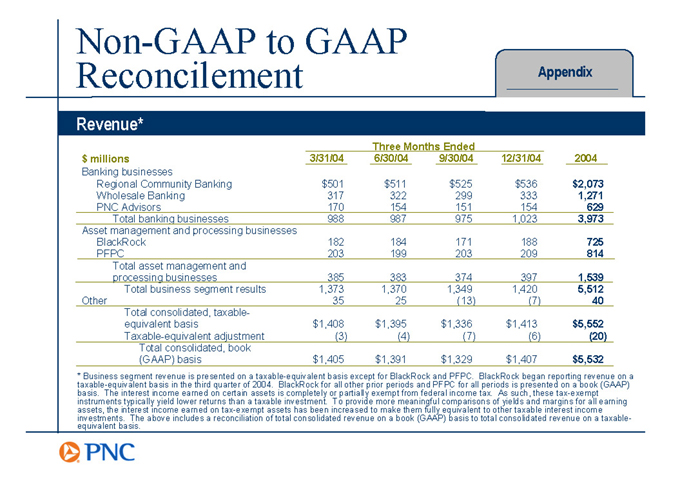
Non-GAAP to GAAP Reconcilement
Appendix
Revenue*
Three Months Ended
$ millions 3/31/04 6/30/04 9/30/04 12/31/04 2004
Banking businesses
Regional Community Banking $ 501 $ 511 $ 525 $ 536 $ 2,073
Wholesale Banking 317 322 299 333 1,271
PNC Advisors 170 154 151 154 629
Total banking businesses 988 987 975 1,023 3,973
Asset management and processing businesses
BlackRock 182 184 171 188 725
PFPC 203 199 203 209 814
Total asset management and
processing businesses 385 383 374 397 1,539
Total business segment results 1,373 1,370 1,349 1,420 5,512
Other 35 25 (13) (7) 40
Total consolidated, taxable-
equivalent basis $ 1,408 $ 1,395 $ 1,336 $ 1,413 $ 5,552
Taxable-equivalent adjustment (3) (4) (7) (6) (20)
Total consolidated, book
(GAAP) basis $ 1,405 $ 1,391 $ 1,329 $ 1,407 $ 5,532
* Business segment revenue is presented on a taxable-equivalent basis except for BlackRock and PFPC. BlackRock began reporting revenue on a taxable-equivalent basis in the third quarter of 2004. BlackRock for all other prior periods and PFPC for all periods is presented on a book (GAAP) basis. The interest income earned on certain assets is completely or partially exempt from federal income tax. As such, these tax-exempt instruments typically yield lower returns than a taxable investment. To provide more meaningful comparisons of yields and margins for all earning assets, the interest income earned on tax-exempt assets has been increased to make them fully equivalent to other taxable interest income investments. The above includes a reconciliation of total consolidated revenue on a book (GAAP) basis to total consolidated revenue on a taxable-equivalent basis.
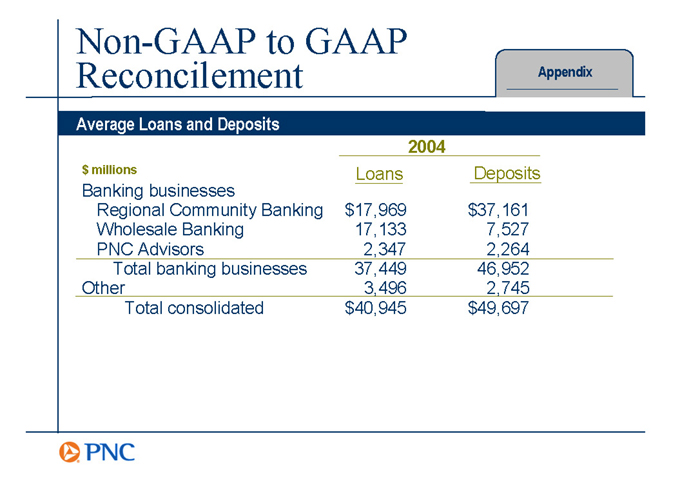
Non-GAAP to GAAP Reconcilement
Appendix
Average Loans and Deposits
2004
$ millions Loans Deposits
Banking businesses
Regional Community Banking $ 17,969 $ 37,161
Wholesale Banking 17,133 7,527
PNC Advisors 2,347 2,264
Total banking businesses 37,449 46,952
Other 3,496 2,745
Total consolidated $ 40,945 $ 49,697